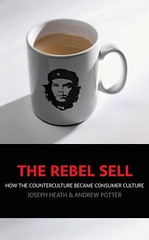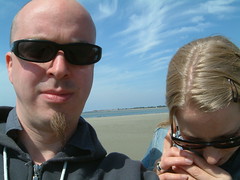I have just finished reading this book - 'The Rebel Sell: How the Counter Culture became Consumer Culture' - by two Canadians, Joseph Heath and Andrew Potter and i can honestly say it is one of the most challenging books i have read for a long time. Their basic premise - which they then work through lots of different countercultural issues - is that the whole idea of a counterculture mitigates against real positive change in society because it derides the whole notion of incremental change through political engagement. The only thing worth pursuing, the countercultual critics would say, is a total overthrow of the system...anything less than that is not worth getting out of bed for.
So, for Heath and Potter - 2 Canadian academics (and, I suspect, neo-Marxists), the idea of the counterculture can actually get in the way of real change.
They also have some very interesting things to say about the marketing of rebellion and cool, and this aspect of the book raised a fascinating question for me about emerging church. here is my question:
if all the perspectives, values, practices etc. that we are fighting for in the whole emerging church 'movement' suddenly got adopted by the mainstream church, would we be happy and once more 'play nicely with all the other children'? or would we be looking for something else to preserve our distinctiveness on the edge of church? i.e. are we purely interested in those theological/ecclesiological issues or do we derive some sense of identity from being the 'emerging' church that has more to do with wanting to be on the edge, wanting to be cool and rebellious, than it has to do with anything else?
Subscribe to:
Post Comments (Atom)


5 comments:
Emergents want and need the "cultural linguistic" dimension to their faith, the rites "through which the interpretive pattern of the religion is exhibited, transmitted, and interiorized."
The rites that they borrow from the "edge" (and its always "borrowing" as nothing original has ever emerged from Emergent)are meant to exhibit, transmit and interiorize something OTHER than the (hip) evangelical Protestant religion that they are attempting to accessorize.
Yet still, they grab-bag rites and practices as if they are "plug and play" accessories that will enhance their individual experiences without changing their fundamental protestant ethos.
Addiction to edginess is just another symptom of "What is wrong with evangelical theology."
Excerpts from:
What's Wrong with Evangelical Theology?
Peter J. Leithart
http://www.leaderu.com/ftissues/ft9608/opinion/leithart.html
Evangelicals entered the mainstream of American life during the late 1970s and "almost immediately" lost their ability to define themselves theologically.
Modernity's separation of public and private has limited evangelicals' beliefs "to matters of private experience, increasingly shorn of their distinctive worldview, and increasingly withdrawn from what was external and public."
Ultimately, "being evangelical has come to mean simply that one has had a certain kind of religious experience that gives color to the private aspects of daily life but in which few identifiable theological elements can be discerned or, as it turns out, are necessary."
The theological wheel has turned again in the same circle: "Evangelicals, no less than the Liberals before them whom they have always berated, have now abandoned doctrine in favor of 'life.'"
Evangelicalism is, after all, often defined as a branch of Christianity that gives particular emphasis to certain aspects of Christian experience: spiritual rebirth, conversion, and a personal relationship to Christ. Spend a little time among evangelicals, and you are sure to learn about people who believe all the right doctrine but are not "real"-which is to say, born-again- Christians. Long before neo-evangelicalism, long before the rise of the Christian right, long before the "Toronto blessing," revivalism gave American Protestantism its distinctive experiential shape, as wave after wave of anti-intellectual New School, New Light, and New Whatever movements were accepted and, paradoxically, accorded theological legitimation.
...evangelicals are drawing "increasingly injurious" conclusions from the appropriate emphasis on a believer's personal relationship with Christ: "They have proceeded to seek assurance of faith not in terms of the objective truthfulness of the biblical teaching but in terms of the efficacy of its subjective experience." Not only in the use of testimonies but in hymnody as well, evangelicalism is "changing direction to reflect this experience-centered focus."
...evangelicalism oscillates between...emphasizing assent to propositional truth one moment, then insisting on personal experience of the new birth as a (perhaps the) central reality of Christianity.
Evangelicalism, however, has little sense of the "cultural-linguistic" dimension of Christianity... In this approach, religion is not merely a system of propositions nor a symbolic expression of natural and universal religious experience; religion is instead a comprehensive interpretive scheme, embodied in narrative and ritual, which structures human experience and thought. From this viewpoint, Christianity is indeed seen as a "life," but as a communal life that includes not only a system of ritual and worship and a way of living, but also a way of speaking and thinking.
Doctrine and theology can take a very high profile in a cultural- linguistic approach, but doctrine would not be the sole mark of true Christianity.
An evangelical understanding of theology and church life in a cultural-linguistic mode could avoid the intellectualist extreme of a cognitive approach as well as the irrationalist extreme of the expressivist model.
A cultural-linguistic conception of Christianity highlights the need for evangelical sacramental and liturgical theology.
Evangelicals well understand how doctrines and moral standards shape and define a community, but their instinctive anti-ritualism leaves them bereft of the theological tools required for understanding how rites mold, sustain, and nourish the Church.
Evangelicals typically examine ritual only for enhancing individual experience. At the risk of sounding pretentiously postmodern, evangelicals would be served by reflections toward a "meta-liturgics," a liturgical theology that does not ask, "What is the warrant for this gesture?" or "Must we say these words?" but instead seeks the meaning and status of ritual action as such.
From the cultural-linguistic perspective, rites are as important as doctrines in defining a community.
Rites... are not mere external decorations but the means through which the interpretive pattern of the religion is exhibited, transmitted, and interiorized.
In this perspective the narrative and ritual patterns of Christianity do not merely express prior religious experience but give shape to experience and even form the conditions of the possibility of Christian experience.
Perhaps we are not going too far to suggest that the shape of evangelicalism depends on its answer to the question of infant baptism, which sharply poses the question of whether it is possible for external rites to shape experience, rather than merely expressing it.
wow - thanks, Anonymous (I think) for taking the time to write such a comprehensive comment! i'm not sure i follow your thinking entirely but i appreciate the effort. who are you?!
I saw that book in your bog and want to borrow it when you're finished :D
saw the book on your blog and will go and buy one.
I have always had this sort of concern about the edge and the emergent movement. So much of it could be just rebranding and avoids harder issues of making it work politically and incrementally from the inside out...good to see you have gotton into the anglican church though...from the inside out and slowly but surely could be watchwords for the emergents.
I am so excited by it all but also feel so let down by the lack of any attempt to answer some of the hardest questions like the one raised in this book.
thanks Matt, great review, this is such an important book! I found it via the BBC Focus magazine...
Post a Comment